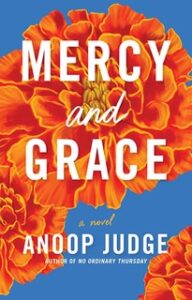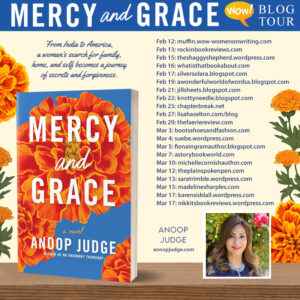Novelist Anoop Judge is chatting with me today about her new upmarket fiction, Mercy and Grace.

She’s in the midst of a tour with Wow! Women on Writing. You can find full tour information below the interview.
Bio:
Born and raised in New Delhi, I now reside in California. I hold an MFA in Creative Writing from Saint Mary’s College of California and am the recipient of the 2021 Advisory Board Award, and the 2023 Alumni Scholarship.
I am the author of four novels: The Rummy Club, which won the 2015 Beverly Hills Book Award, The Awakening of Meena Rawat an excerpt of which was nominated for the2019 Pushcart Prize, No Ordinary Thursday, and Mercy and Grace.
You may also recognize me from the show Gems of Ruby Hill, a reality-TV series streaming on @watchcpics showcasing my life as an author and writer.
I call myself a recovering litigator: I practiced in state and federal courts for many years before I replaced legal briefs with fictional tales.
I am an Instructor at Stanford University’s Stanford Continuing Studies.
Welcome, Anoop. Please tell us about your current release.
Mercy and Grace is a story of gender, familial bonds, second chances, and the consequences of religious hatred, with the narratives and protagonist stories playing out against the backdrop of big, fat Indian weddings. Gia Kumari was an orphan on the edge of destitution in India until Sonia Shah of Golden State Weddings & Events offered the twenty-one-year-old an internship and brought her to San Francisco. Now she is a fish out of water, happily bathing in a world of excess and meeting her only known family—her Uncle Mohammed—for the first time, while also embarking on her first romantic relationship with the dashing yet quirky Adi.
But the shadow of a dark past lurks in the background, one of fundamentalist fervor and a ruined interfaith wedding in modern-day Hindu-majority India, things that Gia is unaware of until they come crashing back into her present-day life, exposing a web of lies and misunderstandings on which her new-found happiness—and even her relationship with Adi—have been based upon. If Gia is to save what matters to her most, she must come to terms with a tragic past and, in observing the dark side of human nature at the event planning company.
What inspired you to write this book?
I was inspired to write Mercy and Grace, because the India that exists now is very different from the one I grew up in. Over the years, the religious right in India has used hate propaganda to push the country away from its inclusive, secular founding vision as envisaged by Mahatma Gandhi.

Hinduism used to be a very liberal and tolerant religion, but India’s current prime minister Narendra Modi’s Bharatiya Janata Party (BJP) has created a distinct fascist ideology dubbed “Hinduvata” to distinguish it from Hinduism. “The movement does not demand a theocratic state or any explicit embrace of Hinduism as the state religion. Hindutva is a national-cultural rather than a religious category, seen as synonymous with the idea of India. Indians of other faiths, including Muslims, should therefore have no trouble accepting Hindutva, according to the Sangh Parivar. If they choose not to, they must be traitors to the nation.” (Ref: https://thereader.mitpress.mit.edu/the-rise-of-hindu-nationalism/)
I have watched the growing trend of extreme loathing backed by physical violence against Muslims and Christians with fear in my heart. I am not a Muslim myself, but I am a Sikh, a minority religion derivative of Hinduism. I witnessed firsthand how fundamentalist group leaders coordinated and led frenzied mob attacks against innocent Sikh citizens when Prime Minister Indra Gandhi was assassinated by her own Sikh security guard who acted solely of his own volition.
In spite of the divisive political administration in the last White House election, I do not exaggerate when I say that I feel safer in the United States than I do in India.
So, I wanted to write a novel about how the giving and taking of religious offense against minorities affects innocent people, ordinary people who have no stake in politics but are only trying to live their small lives.
What exciting story are you working on next?
I am working on a story about an open marriage that gets upended when all the rules get broken. Here is the working blurb for it:
What do you get after two children and ten years of marriage? The answer for Uma and her husband, Vikram, is “stuck in a rut.” But these two natural-born Indians living in Northern California have always prided themselves on being modern, liberal, forward-thinking people. An open marriage could be the answer, as long as they can follow a few simple rules: One-night stands only, with no communication after. And definitely no one they know.
This arrangement works perfectly, and even breathes new life back into their marriage, until Uma sleeps with her best friend’s husband, misled into believing that they, too, have an open marriage. This would be okay, if he didn’t become obsessed with her, constantly pestering her and threatening to reveal what happened between them. When Uma finds she is pregnant, how will Deepesh react when he and his wife, Binny can never have children?
When did you first consider yourself a writer?
I was raised in a middle-class family in New Delhi, India, where education was key, fresh pomfret fish for dinner was a treat, and budget-conscious holidays in hill stations defined our summers. As a young girl, I was expected to apply myself at college, get a job that would allow me to be financially self-reliant, get married, and have kids—in that order.
Given this worldview, “writing” was a bourgeois activity, encouraged by my mom, an avid fan of Reader’s Digest and Harlequin romances. My mom loved stories, and she made up endless tales on the fly—Ravan, the demon who was afraid of cake, the fairy who couldn’t find her magic, the princess who was forced to marry the tyrannical prince and was rescued just in time by the pauper she loved.
She gave me those things, and that’s how I survived adolescence. My command over the English language made me appear smarter than I was—growing up in post-colonial Delhi, where your zip code and what your Dad did for a living was all that mattered, the only way for a young woman to stand out was her chutzpah and her ability to flaunt her knowledge of big, blocky English words.
Soon, I had a prolific output. At age eleven, my mother made my brother, and I compete in a war of words—we had to write an essay about an out-of-town family wedding we’d attended—and, from the way my mom’s dark eyes shone as she read my offering, I knew I’d scored. In my teens, I spilled my hormonal angst over pages and pages of a daily journal that began with the salutation, “Dear, Diary.” One summer, I did an internship at a leading advertising agency as a copywriter, coming up with pithy slogans and jingles. After high school, when I enrolled in Hindu College at Delhi University to pursue a bachelor’s degree in English Literature, no one in my family was surprised.
But, convention dictated that I procure a practical degree that would result in a paying job. This catapulted me into law school after graduation. Writing remained my first love, though—while pursuing my legal studies, I wrote a column for ‘Mid-day,’ a weekly newspaper, titled ‘University Beat’, and I was a correspondent for All India Radio, submitting weekly news stories that were read aloud on air. While in my second year at law school, I was approached by a publishing house (Twenty-Twenty Media) to write a Dummies—style book for recent college graduates on the legal profession titled “Law: What’s It All About and How to Get in.”
When a mess of typewritten pages—loosely bound by a haldi-stained pink ribbon—of dozens of interviews with notable legal experts in New Delhi became a published book of 92 pages, I couldn’t get over the shock of it. It was an eye-opening experience to see how good editing and an attractive book cover could transform my word vomit into a brilliantly-structured, polished work. I knew then that when I had the time, I would write books that appealed me to as a reader—fiction that wove imaginary worlds and left me spellbound with the magic of it.
When I met and married my husband and immigrated to the United States, I continued to pursue my legal studies, acquiring both a JD and an Esq. at the end of my name. Writing legal briefs that would persuade judges opened my critical eye and taught me how to turn a good phrase. When I left law practice and stayed home to raise my kids, I began writing in earnest.
Ten years ago, my dream came true with the launch of my first novel ‘The Rummy Club’ (Daggerhorn Publishing; 2014) that gave voice through my story to the East-Indian diaspora in the context of 21st century America. In the last ten years, I’ve continued to learn the craft of fiction and write stories that have been published in many literary journals
The themes of recreating identity, immigration, changing roles of women, and racial conflict deeply resonate with me and inspire me to write. I am passionate about applying these themes to my background and the traditions I grew up with, as well as the new traditions I have co-created with my first-generation children while living in America.
I’m fortunate that I have a literary agent who believes in my stories, and although the publishing industry is fickle—my fifth novel narrating the story of two estranged sisters based on colorism—-didn’t receive much traction from acquiring editors forcing me to shelve it, I continue to write. As Anne Frank said, “I can shake off everything as I write; my sorrows disappear, my courage is reborn.”
(Excerpted from Anoop Judge’s Nov 1, 2020 blog post.)
Do you write full-time? If so, what’s your work day like? If not, what do you do other than write and how do you find time to write?
Yes, I write full-time. I’m always working on new novel ideas, even when I’m not working. I use the iPhone Note feature to jot down ideas as I’m driving or in the shower, but most commonly when I’m walking my dog, and I’m alone. Usually, I write in the mornings, as soon as I wake up and I continue until about noon when I attend my Pilates class.
I am also teaching at Stanford University this winter quarter.
What would you say is your interesting writing quirk?
That I write by hand until I have a firm outline of the story in my head.
As a child, what did you want to be when you grew up?
I wanted to be a journalist, but I became a lawyer. Now, I’m actually doing what I’m passionate about.
Anything additional you want to share with the readers?
This January 22, 2024, Indian Prime Minister Narendra Modi inaugurated a gigantic new temple for the Hindu god, Ram, prompting accusations that he’s stirring religious tensions, AGAIN. Why this matters: My novel, Mercy and Grace explains how Hindus and Muslims have long contested the temple’s holy site, which was once home to a historic mosque. In 1992, a Hindu mob destroyed the mosque during nationwide riots that killed about 2,000 people — most of them Muslims, which is the backdrop to the love story of Mercy and Grace.
India’s Hindus say the site is the birthplace of Lord Ram and was holy to them before Muslims built the mosque. Now, many say the temple is a move toward establishing Hindu supremacy in India and that Modi is using it for political gain ahead of elections in the spring. That is what makes this novel so relevant now.
Links:
Website | Instagram | LinkedIn | Twitter | Facebook

Blog Tour Calendar
February 12th @ The Muffin
Join us as we celebrate the launch of Anoop Judge’s book Mercy and Grace. Read an interview with the author and enter to win a copy of her book. https://muffin.wow-womenonwriting.com
February 13th @ Rockin Book Reviews
Visit Lu Ann’s blog for her review of Mercy and Grace. You can also win a copy of the book. https://www.rockinbookreviews.com/
February 15th @ The Shaggy Shepherd
Visit Isabelle’s blog for a guest post by Anoop about creating compelling characters. https://theshaggyshepherd.wordpress.com/
February 16th @ What is That Book About
Join Michelle for her spotlight of Mercy and Grace. https://www.whatisthatbookabout.com/
February 17th @ Silver’s Review
Visit Elizabeth’s blog for her spotlight of Mercy and Grace. http://silversolara.blogspot.com/
February 19th @ A Wonderful World of Books
Visit Joy’s blog for a guest post by Anoop Judge about Indian wedding traditions. https://awonderfulworldofwordsa.blogspot.com/
February 21st @ Jill Sheets’ blog
Visit Jill’s blog for an interview with author Anoop Judge. https://jillsheets.blogspot.com/
February 22nd @ Knotty Needle
Check out Judy’s blog for her review of Mercy and Grace. http://knottyneedle.blogspot.com/
February 25th @ Chapter Break
Visit Julie’s blog for a guest post by Anoop Judge about her journey from litigator to writer. https://chapterbreak.net
February 27th HERE!
February 29th @ The Faerie Review
Join Lily for her spotlight of Mercy and Grace. https://www.thefaeriereview.com
March 1st @ World of My Imagination
Join Nicole for her book review of Mercy and Grace. https://worldofmyimagination.com
March 3rd @ Boots, Shoes, and Fashion
Join Linda for her in-depth interview with Anoop Judge about her book Mercy and Grace. https://bootsshoesandfashion.com/
March 4th @ One Writer’s Journey
Visit Sue’s blog for her review of Mercy and Grace by Anoop Judge. https://suebe.wordpress.com/
March 5th @ Word Magic
Join Fiona’s blog for a guest post by Anoop Judge about managing the call with a literary agent. https://fionaingramauthor.blogspot.com/
March 7th @ A Storybook World
Join Deirdra for her spotlight of Mercy and Grace. https://www.astorybookworld.com/
March 10th @ Michelle Cornish’ blog
Visit Michelle’s blog for her review of Mercy and Grace. https://michellecornishauthor.com/blog/book-reviews
March 12th @ Plain Spoken Pen
Join Lisa for her review of Mercy and Grace. https://theplainspokenpen.com/
March 13th @ Sara Trimble’s blog
Join Sara for her review of Mercy and Grace. You also have the chance to win a copy of the book too! https://saratrimble.wordpress.com/
March 15th @ Choices
Visit Madeline’s blog for a guest post by Anoop Judge about writing your way through grief. https://www.madelinesharples.com/
March 17th @ Boys’ Moms Reads
Visit Karen’s blog for her review of Mercy and Grace by Anoop Judge. https://karensiddall.wordpress.com/
March 17th @ Nikki’s Book Reviews
Visit Nikki’s blog for a review of Mercy and Grace. https://nikkitsbookreviews.wordpress.com/
